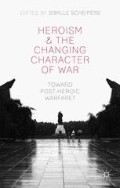Abstract
In a collection of essays, published in Amsterdam in 2009, on the constantly changing dynamics of the memory of the Second World War in the Netherlands, seen in an international context, Dutch historians pointed to a significant divergence between how this conflict was being remembered in Western Europe and in the USA.1 They concurred with Norman Davies’s view, presented during a conference in Amsterdam in 2007 on ‘European Identity and the Second World War’, that the American-British interpretation of the Second World War as the Good War, an epic struggle of democratic heroes stubbornly determined to slay the Nazi monster, had long managed to ‘colonize’ Western Europe’s portrayal of the war in films, literature and historiography.2
Access this chapter
Tax calculation will be finalised at checkout
Purchases are for personal use only
Preview
Unable to display preview. Download preview PDF.
Notes
Steven Ambrose, Citizen Soldiers (New York: Touchstone, 1998)
Tom Brokaw, The Greatest Generation (New York: Random House, 2001).
Gar Alperovitz, Atomic Diplomacy: Hiroshima and Potsdam (New York: Simon & Schuster, 1965).
Studs Terkel, ’The Good War’: An Oral History of World War II (New York: New Press, 1997).
Michael C.C. Adams, The Best War Ever: America and World War II (Baltimore, MD: Johns Hopkins University Press, 1993).
Kenneth Rose, Myth and the Greatest Generation: A Social History of Americans in World War II (New York: Routledge, 2007).
John Bodnar, The ‘Good War’ in American Memory (Baltimore, MD: Johns Hopkins University Press, 2010).
Robert and Jane Easton, Love and War: Pearl Harbor through V-JDay (Norman, OK: University of Oklahoma Press, 1991), p. 296.
Annette Tapert (ed.), Lines of Battle: Letters from American Servicemen, 1941–1945 (New York: Times, 1987), p. 254.
Alvin Kernan, Crossing the Line: A Bluejacket’s World War II Odyssey (Annapolis, MD: Naval Institute Press, 1994), p. 87.
Peter Schrijvers, The Unknown Dead: Civilians in the Battle of the Bulge (Lexington, KY: University of Kentucky Press, 2005).
Author information
Authors and Affiliations
Editor information
Editors and Affiliations
Copyright information
© 2014 Peter Schrijvers
About this chapter
Cite this chapter
Schrijvers, P. (2014). War against Evil: The Second World War. In: Scheipers, S. (eds) Heroism and the Changing Character of War. Palgrave Macmillan, London. https://doi.org/10.1057/9781137362537_6
Download citation
DOI: https://doi.org/10.1057/9781137362537_6
Publisher Name: Palgrave Macmillan, London
Print ISBN: 978-1-349-47270-3
Online ISBN: 978-1-137-36253-7
eBook Packages: Palgrave History CollectionHistory (R0)

